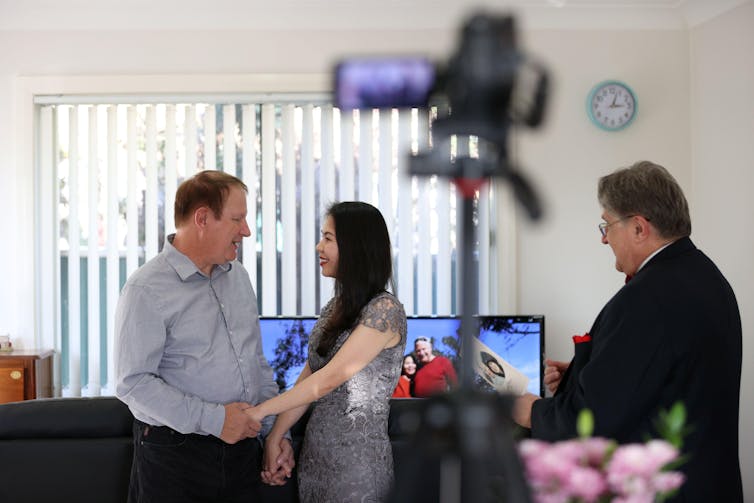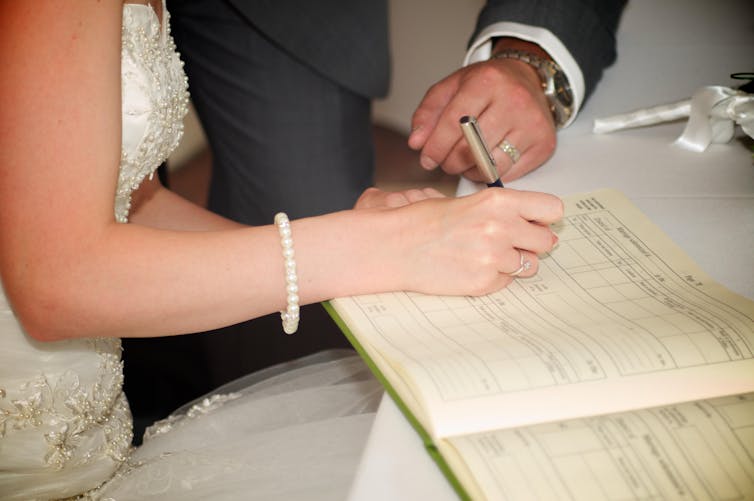Fifteen months after the first lockdown, the government has finally responded to increasing pressure to make it easier for couples to legally marry by allowing outdoor civil weddings from July 1 2021. This will no doubt provide welcome reassurance for couples who have booked ceremonies at approved venues, offering a back-up plan if it’s deemed safer for groups of people to gather outside.
However, for some couples it has come too late. As part of our ongoing research project funded by the Nuffield Foundation on non-legally binding wedding ceremonies, we’ve spoken to a number of couples who were married unofficially through religious or belief ceremonies because of the pandemic. Our work sheds some light on why people might have decided to have a non-binding ceremony.
Under normal circumstances, many of these couples would have also had a legal ceremony. But due to COVID-19 restrictions, register offices offering legal unions have very long waiting lists. It’s not clear how many people are in this position across England and Wales, but a lack of availability for them to convert their personal contract into a legal marriage could present significant problems for such couples in the future. Without legal recognition, marriages aren’t protected by family law.
Challenges for lockdown weddings
When the government drew up its pandemic plans, it doesn’t seem as though much thought was given to couples who consider marriage a prerequisite for living together. There were periods when it wasn’t possible to get married at all. Many such couples simply chose to go through a ceremony that would be recognised by their religion or belief as a legitimate marriage.
In some cases, deciding to live together had been hastened by COVID-19. As one female imam who participated in our study reported: “We’ve had a huge increase in people saying yes, we want to make a home with our partner, and we need to do it right now.”

This wasn’t the only reason for having a non-legally recognised ceremony. Other couples who’d been unable to have their legal wedding still wanted to mark the occasion. One humanist celebrant reported a couple saying: “We would really like to do something on the day that we were due to get married because, in our head, that’s our wedding day.”
That ceremony, like countless others, took place via Zoom, the only option for many couples during periods of lockdown. As the minister of an online Christian wedding conducted on YouTube and Zoom told us, the couple he married was “in the life of the church, and when the first lockdown came they wanted to be able to live together and for us that means they need to get married”.
We also spoke to a number of imams who had conducted nikahs (Muslim wedding ceremonies) by Zoom for similar reasons. As one noted, “it satisfies them spiritually, religiously, even socially to that extent”.
There were also long periods in 2020 when small groups could meet but restrictions on legal weddings remained. Numerous imams reported that they conducted a lot more nikahs in people’s homes during this period. An imam we interviewed told us that while he would’ve preferred nikahs to take place in the mosque, he had no choice but to “flex on that”. Weddings at home were also reported by Hindu priests for similar reasons.
Waiting lists for register offices
A large number of the celebrants we interviewed emphasised that while they would normally only conduct a ceremony if a couple was already legally married, they made exceptions. One imam reported how a civil wedding had been scheduled for the same day as the nikah but the local authority had cancelled it at the last minute. His compromise was to go ahead with the nikah but defer giving the couple their certificate until they had married legally.

Even when weddings were able to go ahead, celebrants reported couples having issues with securing slots for civil ceremonies. One imam noted that the couple whose nikah he had conducted were “on a waiting list”, adding: “I know in some places they’ve been told that … for the remainder of 2020 there’s basically no way that they can register their marriage.”
Similarly, a humanist celebrant reported how a couple who had been wed in a humanist ceremony “were going to get legally married at some point when they could get a cheap booking with the registry office, which is not easy”.
As many of these experiences indicate, those who already regard themselves married may not want an elaborate second ceremony. As many of our interviewees put it, they just want the “piece of paper”.
Unless it becomes necessary for weddings to take place outside for safety reasons, it would be far better for local authorities to focus their resources on making more slots available for legal formalities to be completed, by increasing the number (and visibility) of statutory ceremonies. Otherwise, the risk is that the longer the delay, the less urgent legal formalities may seem, and the greater the likelihood that legal ceremonies won’t take place at all.
One way around that issue would be for local authorities to help these couples to marry legally – not in a lavish ceremony on approved premises, but by offering more simple £46 statutory ceremonies in register offices.
The £46 ceremony is contained in statute – but, in reality, register offices offer only few of these appointments each week. These usually take place during undesirable times and days, with ceremonies conducted in simple offices and a maximum of two witnesses as guests.
While this might seem unappealing, it’s perfect for couples who have already had non-legally recognised marriage ceremonies that are meaningful to them. To serve couples like these, more such appointments need to be made available as soon as possible.
![]()
Rajnaara C Akhtar receives funding from the Nuffield Foundation.
Rebecca Probert is co-investigator on the Nuffield-funded project. She is the specialist consultant to the Law Commission on its Weddings Project










